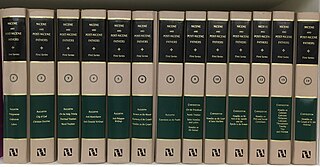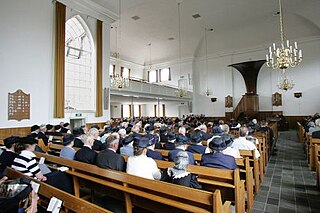Sola scriptura is a Christian theological doctrine held by most Protestant Christian denominations, in particular the Lutheran and Reformed traditions, that posits the Bible as the sole infallible source of authority for Christian faith and practice. The Catholic Church considers it heterodox and generally the Orthodox churches consider it to be contrary to the phronema of the Church.
The five solae of the Protestant Reformation are a foundational set of Christian theological principles held by theologians and clergy to be central to the doctrines of justification and salvation as taught by the Calvinism and Lutheranism branches of Protestantism, as well as in some branches of Pentecostalism. Each sola represents a key belief in these Protestant traditions that is distinct from the theological doctrine of the Catholic Church, although they were not assembled as a theological unit until the 20th century. The Reformers are known to have only clearly stated two of the five solae. Even today there are differences as to what constitutes the solae, how many there are, and how to interpret them to reflect the Reformers' beliefs.
Christian tradition is a collection of traditions consisting of practices or beliefs associated with Christianity. These ecclesiastical traditions have more or less authority based on the nature of the practices or beliefs and on the group in question. Many churches have traditional practices, such as particular patterns of worship or rites, that developed over time. Deviations from such patterns are sometimes considered unacceptable by followers or are regarded as heretical. There are certain Christian traditions that are practiced throughout the liturgical year, such as praying a daily devotional during Advent, erecting a nativity scene during Christmastide, chalking the door on Epiphany Day, fasting during Lent, waving palms on Palm Sunday, eating easter eggs during Eastertide, and decorating the church in red on Pentecost.
Formal principle and material principle are two categories in Christian theology to identify and distinguish the authoritative source of theology from the theology itself, especially the central doctrine of that theology, of a religion, religious movement, tradition, body, denomination, or organization. A formal principle tends to be texts or revered leaders of the religion, while a material principle is its central teaching. Paul Tillich believed the identification and application of this pair of categories in theological thinking to have originated in the 19th century. As early as 1845 the Protestant theologian and historian Philip Schaff discussed them in his The Principle of Protestantism. They were utilized by the Lutheran scholar F. E. Mayer in his The Religious Bodies of America in order to facilitate a comparative study of the faith and practice of Christian denominations in the United States. This is also treated in a theological pamphlet entitled Gospel and Scripture by the Commission on Theology and Church Relations of the Lutheran Church—Missouri Synod.
The infallibility of the Church is the belief that the Holy Spirit preserves the Christian Church from errors that would contradict its essential doctrines. It is related to, but not the same as, indefectibility, that is, "she remains and will remain the Institution of Salvation, founded by Christ, until the end of the world." The doctrine of infallibility is premised on the authority Jesus granted to the apostles to "bind and loose" and in particular the promises to Peter in regard to papal infallibility.

Sacred tradition, also called holy tradition or apostolic tradition, is a theological term used in Christian theology. According to this theological position, sacred tradition is the foundation of the doctrinal and spiritual authority of Christianity and of the Bible. Thus, the Bible must be interpreted within the context of sacred tradition and within the community of the denomination. The denominations that ascribe to this position are the Catholic, Eastern Orthodox, and Oriental Orthodox churches, and the Assyrian churches.

The Reformed Church in the United States (RCUS) is a Protestant Christian denomination in the United States. The present RCUS is a conservative, Calvinist denomination. It affirms the principles of the Reformation: Sola scriptura, Solus Christus, Sola gratia, Sola fide, and Soli Deo gloria. The RCUS has membership concentrated in the Midwest and California.
Prima scriptura is the Christian doctrine that canonized scripture is "first" or "above all" other sources of divine revelation. Implicitly, this view suggests that, besides canonical scripture, there can be other guides for what a believer should believe and how they should live, such as the Holy Spirit, created order, traditions, charismatic gifts, mystical insight, angelic visitations, conscience, common sense, the views of experts, the spirit of the times or something else. Prima scriptura suggests that ways of knowing or understanding God and his will that do not originate from canonized scripture are perhaps helpful in interpreting that scripture, but testable by the canon and correctable by it, if they seem to contradict the scriptures. Prima sciptura is upheld by the Anglican, Methodist and Pentecostal traditions of Christianity, which suggest that Scripture is the primary source for Christian doctrine, but that "tradition, experience, and reason" can nurture the Christian religion as long as they are in harmony with the Bible.

The Free Presbyterian Church of Ulster is a Calvinist denomination founded by Ian Paisley in 1951. Doctrinally, the church describes itself as fundamentalist, evangelical, and separatist, and is part of the reformed fundamentalist movement. Most of its members live in Northern Ireland, where the church is headquartered, and in County Donegal. The church has additional congregations in the Republic of Ireland, Great Britain and Australia, and a sister denomination in North America, the Free Presbyterian Church of North America, which has congregations in Canada and the United States. It also has a sister denomination in Nepal which was formed from the Nepal mission to the Unreached in November 2013.

Reformed fundamentalism arose in some conservative Presbyterian, Congregationalist, Reformed Anglican, Reformed Baptist, Non-denominational and other Reformed churches, which agrees with the motives and aims of broader evangelical Protestant fundamentalism. The movement was historically defined by a repudiation of liberal and modernist theology, the publication (1905–1915) entitled, The Fundamentals, and had the intent to progress and revitalise evangelical Protestantism in predominantly English-speaking Protestant countries, as well as to reform separated churches according to the Bible, historic expression of faith and the principles of the Reformation. The Fundamentalist–Modernist controversy, and the Downgrade controversy, kindled the growth and development of reformed fundamentalism in the United States and the United Kingdom. Reformed fundamentalists have laid greater emphasis on historic confessions of faith, such as the Westminster Confession of Faith. Sixteenth century Reformers such as John Calvin, Martin Luther, John Knox, Theodore Beza, Philip Melanchthon and Protestant ministers such as Matthew Henry, John Gill, John Bunyan, George Whitefield, Jonathan Edwards, Charles Spurgeon, J. C. Ryle, John Burgon, F. B. Meyer, Dwight L. Moody, George Müller and G. Campbell Morgan have shaped the leaders in this reformed tradition.

Grace Presbyterian Church of New Zealand (GPCNZ) is a Presbyterian denomination in New Zealand which was formed in 2002. It currently consists of 21 churches and missions, which are in the process of becoming fully established churches.

In Christianity, the term biblical authority refers to two complementary ideas:
The doctrine of the clarity of Scripture is a Protestant Christian position teaching that "...those things which are necessary to be known, believed, and observed, for salvation, are so clearly propounded and opened in some place of Scripture or other, that not only the learned, but the unlearned, in a due use of the ordinary means, may attain unto a sufficient understanding of them". Clarity of scripture is an important doctrinal and Biblical interpretive principle for historical Protestants and, today, for many evangelical Christians; it is adhered to by the Lutheran, Reformed, Anglican and Methodist churches. Perspicuity of scripture does not imply that people will receive it for what it is, as many adherents to the doctrine of perspicuity of scripture accept the Calvinist teaching that man is depraved and needs the illumination of the Holy Spirit in order to see the meaning for what it is. Martin Luther advocated the clearness of scripture in his work On the Bondage of the Will. Arminius argued for the perspicuity of scripture by name in "The Perspicuity of the Scriptures".

Protestantism is a branch of Christianity that follows the theological tenets of the Protestant Reformation, a movement that began in the 16th century with the goal of reforming the Catholic Church from perceived errors, abuses, and discrepancies.

The regulative principle of worship is a Christian doctrine, held by some Calvinists and Anabaptists, that God commands churches to conduct public services of worship using certain distinct elements affirmatively found in scripture, and conversely, that God prohibits any and all other practices in public worship. The doctrine further determines these affirmed elements to be those set forth in scripture by express commands or examples or, if not expressed, those implied logically by good and necessary consequence. The regulative principle thus provides a governing concept of worship as obedience to God, identifies the set of specific practical elements constituting obedient worship, and identifies and excludes disobedient practices.
The following outline is provided as an overview of and topical guide to Protestantism:
The Presbyterian Church of the Philippines (PCP), officially The General Assembly of the Presbyterian Church of the Philippines, is a growing evangelical, Bible-based Reformed church in the Philippines. It was officially founded in 1987 and the General Assembly was organized in September 1996.

The Reformed Anglican Church (formerly named the Protestant Episcopal Church, USA) is a Continuing Anglican denomination of the Reformed Anglican tradition. It has an episcopal polity and is based in the United States. It was founded as a split in 2009 from the Traditional Protestant Episcopal Church, another Continuing Anglican body. The church is strongly confessional, Reformed and evangelical. It uses the 1928 Book of Common Prayer.

Criticism of Protestantism covers critiques and questions raised about Protestantism, the Christian denominations which arose out of the Protestant Reformation. While critics may praise some aspects of Protestantism which are not unique to the various forms of Protestantism, Protestantism is faced with criticism mainly from the Catholic Church and the Eastern Orthodox Church, although Protestant denominations have also engaged in self-critique and criticized one another. According to both the Catholic Church and Eastern Orthodoxy, many major, foundational Protestant doctrines have been officially declared heretical.
Evangelical theology is the teaching and doctrine that relates to spiritual matters in evangelical Christianity and a Christian theology. The main points concern the place of the Bible, the Trinity, worship, Salvation, sanctification, charity, evangelism and the end of time.











